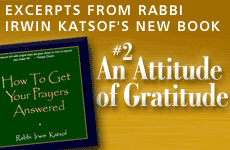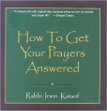 Identifying as a Jew
Identifying as a Jew


7 min read
When we are grateful for God's gifts, He only wants to give us more.
A good friend of mine, Motty, suffered a minor stroke recently. While in the middle of a speech, he suddenly experienced total blindness in one eye. It didn't hurt and he finished what he had to say.
Leisurely, he returned home, but since he still couldn't see out of the one eye, he decided it was best to call a doctor. The doctor told him to get himself to the hospital immediately.
There Motty learned that he had experienced a stroke, and although his eyesight returned within hours, he was warned that he was not out of the woods yet. A stroke often has aftershocks, and all that medicine can do is watch and wait.
Frightened by what was happening, Motty prayed as hard as he knew how, promising God all the while that he would be a better person. He was most fortunate that there were no further repercussions, and he went home totally unimpaired by what had happened.
Filled with gratitude to God for having healed him, he realized that, as a result of the bargains and promises he made, he was now on his way to becoming a much better human being.
Then he realized that he had to be grateful to God for that, too.
God loved him so much that He had sent him this frightening experience for his good.
And suddenly it hit him: God loved him so much, wanted him to be the best he could be so much, that He had sent him the frightening experience of a stroke to make sure he got on with his self-improvement program.
And only then did he realize what he really needed to be grateful for – not so much for the healing, but for the stroke! Suddenly, gratitude took on a whole new meaning for him.
An attitude of gratitude – that is, being grateful for everything God sends us – is a key to praying effectively. And it is a quality that takes some effort to cultivate on a daily basis.
One of my teachers, Rabbi Zelig Pliskin, in his book "Gateway to Happiness", relates the story of a man who one day decided to spend a few minutes appreciating his morning cup of coffee. It was a part of his daily routine and, God forbid, if something went wrong and he had to go without it, he sure missed it.
As he began to ponder this cup of coffee, he jotted down his thoughts. First of all he noted that coffee beans grew in Brazil, and someone had to plant the trees and tend them until the coffee beans reached maturity. Then workers had to pick the beans from the trees. Then beans had to be roasted and ground and packed for shipping. There was tremendous work involved in the shipping industry, which allowed the coffee to reach the United States – this alone required hundreds of people. Finally, the coffee beans arrived in his grocery store.
But that was not all. The water for the coffee was boiled on a gas range and the story of the manufacture and delivery of that appliance into his kitchen could easily fill a book. Then there was the gas, the water, and the kettle that whistled to let him know the water had boiled. The match couldn't be left out. He drank his coffee with milk, so the diary industry had to be considered and all the work involved from the time the milk left the cow until it reached his coffee cup.
At the end of writing furiously for a half-hour, the man had not even begun to describe the cup, saucer and teaspoon he used, the table he placed them on, or the chair he sat in.
He became aware of the thousands of people necessary for him to have a cup of coffee.
For the first time, he became aware of the thousands of people whose work was necessary for him to have that cup of coffee. This awareness led him to a most intense spiritual experience. His prayers for the next few weeks were permeated with a deep feeling of gratitude to his fellow human beings all of whom made it possible for him to exist on this planet.
Now, that's what appreciating a cup of coffee did for this man. But what about all the things that had happened that same morning before he even came into the kitchen?
These same things happen to all of us in much the same order, and we can easily imagine the sequence of events: First, he woke up – there, he was alive! He opened his eyes and watched the objects in his bedroom come into focus. Yes, he had eyesight. Then he moved his hand to rub his eyes. For his hand to move, thousands of electrical and chemical changes had to take place in his body and travel from his brain to his arm.
He looked at the alarm clock, "Oh boy, I better get going." He didn't give it a second thought that everything in his body was functioning just fine – he had eyesight, he had mobility, he had consciousness.
God made sure that he had all these things, but he took them for granted each and every day much the same way he had taken his coffee for granted.
When his coffee wasn't there one morning, he missed it. He appreciated it more when he was deprived of it, when he had run out of coffee beans, or the oven malfunctioned and he couldn't boil water. How much more would he have missed his eyesight, his limbs, his mind!
Just think where you'd be without those seemingly simple gifts. According to government statistics, 50,000 Americans are blinded each year – that means one every minute! So eyesight is nothing to be taken for granted, as my friend Motty learned from his short experience with temporary blindness.
The saying goes: "There for the grace of God, go I." Indeed that is so true. God is looking out for you every second of the day. Yet, we just assume when things are going well, that this is how it should be.
But we can't take anything for granted, as just a cursory look around should tell us. Therefore, reminding ourselves that eyesight, mobility, consciousness and freedom come from God awakens our appreciation for His love and care, which are as infinite as God is Himself.
Before we start beseeching God with our requests, we should acknowledge all He has done for us already.
This is why the Sages advise that, before we start beseeching God with a long litany of our requests, we should acknowledge all that He has done for us already.
The Siddur, the Jewish prayer book, drawing on a tradition two-thousand years old, lists blessings to be said each morning over life's essentials:
Blessed are You Lord, our God, Ruler of the Universe ... Who gives sight to the blind ... Who releases the imprisoned ... Who straightens the bent ... Who guides the steps of man ... Who gives strength to the weary ... Who provided me with all my needs...
Beginning each day with such a reminder might go a long way toward not taking God for granted.
When we appreciate what we've already been given, God will want to give us more.
 Adapted from Rabbi Irwin Katsof's How To Get Your Prayers Answered
Adapted from Rabbi Irwin Katsof's How To Get Your Prayers Answered
Buy the book from amazon.com
Share with us how your prayers were answered. below or email us at prayer@aish.com.
